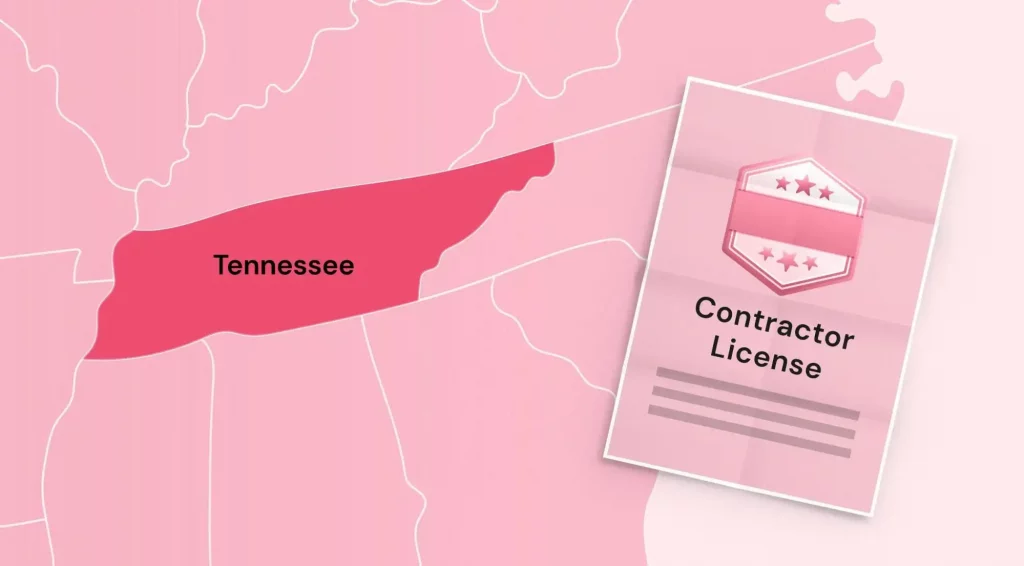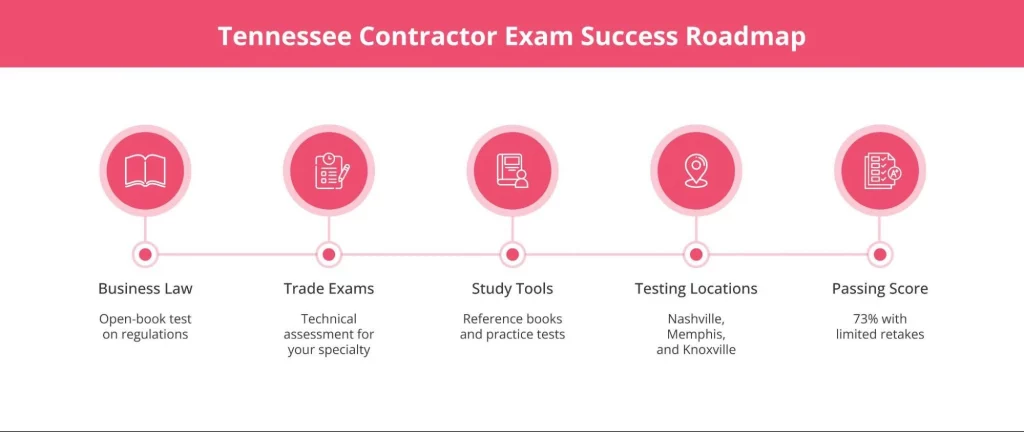Did you know Tennessee has six distinct contractor license classifications for projects over $25,000? Ensuring that you hold the correct Tennessee contractor license would help avoid unnecessary complications and safeguard your business interests.
Your general contractor license in Tennessee serves as a powerful credential in the competitive construction marketplace. This official certification communicates your professional competence to potential clients. Many lucrative opportunities remain available exclusively to properly licensed contractors, including government projects and commercial developments that require specific qualifications.
This guide is designed to help you understand the entire Tennessee contractor licensing process. It will help you learn about the classifications and navigate the application process smoothly, empowering you to secure your license and succeed in this thriving market.

What Are the Tennessee Contractor License Classifications & Requirements?
Tennessee’s contractor licensing guidelines categorize licenses based on project scope and value. Understanding these distinctions is fundamental before you start your Tennessee Contractor License application. This ensures you apply for the correct license type for your business.
- Limited Licensed Residential Contractor (projects under $25,000): This classification, also known as BC-A/r, allows you to work on single-family residential projects with a total cost of $125,000 or less, including all labor and materials. You can obtain this license by completing an approved training course instead of passing an exam, making it an affordable choice.
- Home Improvement License (required in certain counties): If you perform residential remodeling projects between $3,000 and $25,000, specifically in Bradley, Davidson, Hamilton, Haywood, Knox, Marion, Robertson, Rutherford, and Shelby counties, you must hold this license.
- Licensed Contractor classifications (BC, BC-A, BC-B, etc.): The state offers various contractor classifications such as Building Construction (BC), Residential (BC-A), Commercial (BC-B), Small Commercial (BC-b(sm)), and Industrial (BC-C). Each classification permits you to undertake specific types of construction projects, often requiring a trade-specific exam alongside the Business and Law exam.
- Monetary limits and what they mean for your business: Every contractor license in Tennessee comes with a monetary limit, representing the maximum value of projects you can bid on or undertake. This limit is determined by your financial statement, usually ten times your working capital or net worth, and defines the scale of projects you can pursue.
- Specialty classifications and their requirements: Beyond general building classifications, Tennessee offers numerous specialty licenses for specific trades, such as electrical, mechanical, plumbing, HVAC, masonry, and roofing. These classifications have their own unique requirements, including trade-specific exams and adherence to particular regulations for specialized work.
Eligibility Criteria for a Contractor License in Tennessee
Meeting Tennessee’s eligibility standards ensures that you possess the necessary qualifications to deliver quality work and operate your business professionally.
- Experience Requirements: Tennessee requires documentation of relevant construction experience, typically a minimum of three years working in your intended classification area, verified through reference letters from employers, clients, or licensed contractors.
- Financial Stability: The Tennessee Board for Licensing Contractors (TBLC) evaluates your financial capacity to handle projects through detailed financial statements, with net worth requirements varying based on your desired monetary limit—higher limits require greater financial stability.
- Business Structure: You must establish a proper business entity, whether as a sole proprietor, partnership, LLC, or corporation, and register with the Tennessee Secretary of State before applying for your contractor license.
- Background Considerations: The TBLC reviews your personal and professional background, making disclosure of any past legal issues essential, as undisclosed information can result in application denial.
After getting my Tennessee contractor license, my business revenue doubled within six months. Clients trust licensed professionals, and I have secured several commercial projects that were previously out of reach.
– Mark Reynolds, General Contractor, Nashville
How to Prepare Financial Statements for a Tennessee Contractor License?
Properly preparing your financial statement is a critical element for successful license approval.
- Understand the net worth requirements based on monetary limit: Your net worth directly influences the monetary limit assigned to your contractor license in Tennessee. The Board typically grants a limit up to ten times your proven net worth. Ensure your financial statement accurately reflects your assets.
- Prepare financial statements (reviewed vs. audited): For monetary limits up to $1,500,000, a reviewed financial statement suffices. If your desired limit exceeds $1,500,000, you need an audited statement. An independent Certified Public Accountant (CPA) must prepare both types.
- Follow board guidelines for financial documents: The Board scrutinizes your financial documents for accuracy, completeness, and adherence to accounting standards. They want to see a clear picture of your business’s financial health. Highlight strong working capital and a healthy balance sheet.
- Work with accountants for financial statement preparation: Partner with a qualified CPA or licensed public accountant for your financial statement. Their expertise ensures compliance with board requirements. A professionally prepared document significantly strengthens your application for your contractor license in Tennessee.
How Much Does a Tennessee Contractor License Cost?
Understanding the costs involved is a key part of your Tennessee contractors license requirements. Here is a breakdown of the total expenses you need to consider:
- Application Fee: $250 for the initial license application. The primary fee for your Tennessee contractors license application is non-refundable.
- Exam Fees: There are separate fees for the Business and Law exam and any required trade-specific exams. The examination fee ranges between $57 and $75 per test.
- Financial Statement Preparation: You need to submit CPA-reviewed statements for limits up to $3,000,000; audited statements for higher limits. The cost of preparing your reviewed or audited financial statement by a CPA will vary based on the complexity of your financials and the CPA’s rates.
- Renewal Fee: You need to pay $200 as Tennessee contractors license renewal fee every two years.
- Insurance and Bonding: The cost of general liability, workers’ compensation insurance, and any required bonds will depend on your chosen coverage limits, claims history, and the type of work you perform.
- Continuing Education: If you are a residential contractor licensed after January 1, 2009, you will incur costs for Board-approved continuing education courses. These vary by provider.
Knowing the full Tennessee contractor license cost will help you budget for both the application and ongoing compliance requirements.
How Long Does it Take to Get a Contractor License in Tennessee?
The timeline for obtaining your contractor license in Tennessee can vary, but understanding the typical stages can help you plan.
- Application Review: After submitting your complete application, the review process by the Board for Licensing Contractors can take four to six weeks.
- Board Meetings: The Board meets monthly in Nashville to review applications. Ensuring your application is submitted by their specific deadlines is crucial to avoid delays.
- Exam Scheduling: Once your application is accepted, you need to schedule and pass your required exams through PSI Services, LLC. The availability of exam slots can influence your timeline.
The overall time also depends on how quickly you can gather all required documentation, complete any necessary experience hours, prepare your financial statements, and pass your exams.
What are the Steps in the Tennessee Contractor License Application Process?
The Tennessee contractor license application process involves the following distinct stages:
- Step 1: Obtaining and completing the application form: Download the official application packet from the Tennessee Board for Licensing Contractors website. Fill out every section completely and accurately. Provide all requested personal and business details to avoid delays.
- Step 2: Documentation preparation: Gather all supporting documents mentioned in the application, including proof of experience, business registration, and references. Organize these meticulously. This careful preparation prevents application deficiencies.
- Step 3: Submitting proof of insurance and financial statements: Attach your general liability and workers’ compensation insurance certificates. Include the CPA-prepared financial statement, either reviewed or audited. These documents are essential for demonstrating your business’s readiness.
- Step 4: Filing fees and timelines: Pay the non-refundable application fee, currently $250, payable to the State of Tennessee. Submit your complete application well in advance of board meeting deadlines. The review process can take four to six weeks.
- Step 5: Avoiding Common application mistakes: Double-check your application for incomplete sections or missing signatures. Ensure your financial statement matches the required format and accurately reflects your monetary limit request.
What are the Key Tennessee Contractors License Requirements?
Beyond securing your state contractor license in Tennessee, you will encounter additional requirements. Meeting these local and operational standards is equally vital for your business.
Navigating Local Jurisdiction Requirements
Beyond state licensing, you must address additional local requirements. These vary significantly by municipality and are crucial for legal operation.
- County-specific home improvement licenses: Some counties, like Shelby or Davidson, mandate their own home improvement licenses. These apply even if you hold a state license. Always verify local regulations where you plan to work.
- Local business permits and registrations: You will need to obtain general business licenses and permits from the city or county where your main office is located. These are separate from your state contractor license.
- Nashville, Memphis, Knoxville, and Chattanooga specific requirements: Major cities often have unique building codes, zoning laws, and permitting processes. Research these urban centers thoroughly if you intend to work there.
- Local inspections and code compliance: Municipalities conduct their own inspections to ensure your projects meet local building codes. Adhere to these standards for successful project completion and avoid penalties.
- Business tax registrations: Register your business for local taxes, which might include privilege taxes or other municipal levies. This ensures your financial operations are fully compliant. Always confirm specific local rules before starting any project.
After obtaining my specialized electrical contractor license, my business revenue increased by 40% in the first year. Larger commercial clients now consider my bids, and I can charge premium rates for my certified expertise
Sarah Johnson, General Contractor, Texas
Complying with Insurance and Bonding Requirements
Proper insurance and bonding protect your business, clients, and workers. You must meet Tennessee contractors license requirements to be eligible for the license.
- General liability insurance requirements: You need general liability insurance to cover property damage or bodily injury claims. The minimum coverage amount varies based on your project’s monetary limit, often starting at $100,000.
- Workers’ compensation insurance rules: If you have one or more employees, Tennessee law mandates workers’ compensation insurance. This covers medical expenses and lost wages for on-the-job injuries.
- Bond requirements and types: A contractor’s bond guarantees your performance and compliance with regulations. The bond amount often relates to your monetary limit, providing financial protection for your clients.
- How to obtain the right coverage: Consult with an insurance professional specializing in contractor policies. They will help you secure the appropriate general liability, workers’ compensation, and bond coverage tailored to your business needs.
- Maintaining compliance throughout license period: Regularly review and update your insurance policies to ensure continuous coverage. Any lapses could jeopardize your contractor license in Tennessee. Stay vigilant with your policy renewals and adjustments.
How to Prepare for the Tennessee Contractors License Test: Important Guidelines
Passing the required examinations is a critical hurdle in obtaining your license. Understanding the exam content and preparation strategies significantly increases your chances of success.
- Business and Law exam content and format: This mandatory exam covers topics like licensing requirements, estimating, financial management, tax laws, and project management. It is a multiple-choice, open-book test. You must pass this section regardless of your trade.
- Trade-specific examinations: Depending on your chosen classification, you will also take a trade-specific exam, such as Building (BC), Electrical (CE), or Mechanical (CMC). These are typically open-book and assess your technical knowledge within your specialty.
- Study resources and preparation strategies: Utilize official reference books, online courses, and practice exams designed for the Tennessee contractor exams. Create a structured study schedule and dedicate consistent time to mastering the material. Engage with study groups if possible.
- Scheduling your exam and testing locations: PSI Services, LLC administers the exams in various Tennessee locations including Nashville, Memphis, and Knoxville. Schedule your test through their website once you feel prepared. Arrive early on exam day.
- Score requirements and retake policies: You need a minimum score of 73% to pass both the Business and Law and trade-specific exams. If you do not pass, you can retake the exam, but three failures may require a board interview.
How Does the Board Review & Approval Process Work for the Tennessee Contractor License?
The Tennessee Board for Licensing Contractors evaluates each application thoroughly to ensure applicants meet all qualifications before granting licenses.
- The board meets monthly in Nashville to review applications, with specific submission deadlines published on their website.
- Board members examine your experience documentation, financial statements, exam scores, and business structure during their evaluation.
- Some applicants receive requests to appear before the board to address questions about their experience or financial capacity.
- Incomplete documentation and insufficient experience verification represent the most common reasons for application deferrals.
- Respond promptly to any board requests for additional information to avoid unnecessary delays in your application review.
How to Maintain Your Tennessee Contractor License?
Maintaining your contractor license in Tennessee requires ongoing compliance. Understanding Tennessee contractors license renewal requirements ensures uninterrupted business operations and sustained credibility.
Managing the License Renewal Process and Timelines
Your Tennessee contractor license should be renewed every two years. It is highly recommended to submit your renewal application online through the BLC portal at least 30 days prior to your license’s expiration date, along with the following documents:
- Updated financial statement (reviewed or audited, depending on monetary limit).
- Proof of current general liability insurance.
- Workers’ compensation insurance information (certificate of insurance or approved exemption).
- Proof of active status with the Tennessee Secretary of State (for corporate entities).
- Certificate of completion for required continuing education (if applicable).
Fulfilling Continuing Education Requirements (RCE)
Residential contractors licensed on or after January 1, 2009, must complete a minimum of eight hours of continuing education during each two-year renewal period. These requirements can be fulfilled through:
- Approved in-person or online training from authorized education providers
- Active membership in a local Tennessee Home Builders Association, which qualifies for 4 hours of continuing education annually (1 hour per quarter)
The Qualifying Agent (QA) designated on your license is responsible for completing and documenting these educational requirements. Failure to meet continuing education obligations may result in license suspension or additional penalties
Updating Insurance and Bond Documentation
Maintaining adequate insurance and bond coverage is a continuous requirement. With each renewal, you must provide updated proof of your:
- General liability insurance (minimum $100,000 coverage)
- Workers’ compensation insurance (for contractors with employees)
- Current surety bond coverage
If applicable to your license, you must maintain your bond coverage throughout your license period and ensure updated proof is submitted during renewal.
Requesting Monetary Limit Increase
Your Tennessee contractor license is assigned a ‘monetary limit,’ which dictates the maximum value of projects you can undertake. To increase this monetary limit, you must submit an updated financial statement:
- Reviewed Financial Statement: Typically required for monetary limit increases up to $3,000,000.
- Audited Financial Statement: Generally required for monetary limit increases exceeding $3,000,000 (and for “unlimited” limits).
These financial statements must be prepared by a licensed Certified Public Accountant (CPA). The Board determines your monetary limit based on a formula, often ten times of your working capital or net worth, whichever is less.
Complying with License Display Requirements
Tennessee law mandates that your contractor license be prominently displayed at your primary business location. Additionally, your license number must appear on all:
- Contracts and proposals
- Business cards and stationery
- Marketing materials and advertisements
- Company vehicles
- Permit applications
Final Words
Every contractor licensing process requires careful attention to classifications, financial documentation, examination requirements, and board procedures, yet these efforts deliver substantial rewards through access to larger projects and heightened client trust.
The process of how to get a contractor license in Tennessee involves multiple steps, from classification selection to financial preparation and examination completion. While challenging, the Tennessee contractors license requirements ensure only qualified professionals enter the construction industry.
Bookmark this guide and check back regularly for updates on Tennessee contractor license requirements. Please note that regulations are subject to frequent changes, so it is essential to verify current requirements with the Tennessee Board for Licensing Contractors for the most accurate information.
If you need help streamlining your project visualization, client communication, and design process, consider exploring Foyr Neo. We help thousands of construction professionals transform their project documentation and client presentations with powerful 3D design capabilities, creating photorealistic renderings of proposed projects in minutes.
Sign up for a 14-day free trial and discover how our intuitive platform can help your contractor work in Tennessee.
This guide is for information only. Regulations change; so always confirm with the Tennessee Board for Licensing Contractors or your local building office.
FAQs on Tennessee Contractor License
What are the financial requirements for a contractor license in Tennessee?
The Tennessee Board for Licensing Contractors evaluates your financial capacity through detailed financial statements. Your net worth directly influences your assigned monetary limit, with higher limits requiring greater financial stability. You will need a reviewed or audited financial statement prepared by a CPA, depending on your desired monetary limit.
What is the penalty for contracting without a license in Tennessee?
Operating as a contractor without the required license in Tennessee can lead to significant penalties. This may include substantial fines, legal action, and the inability to enforce contracts or collect payment for work performed. Unlicensed activity undermines your professional standing and exposes you to considerable risk.
How much work can you do without a contractor license in TN?
In Tennessee, a state contractor license is generally required for projects valued at $25,000 or more. For residential remodeling projects between $3,000 and $25,000, a Home Improvement License is required in certain counties. Projects under these thresholds may not require a state-level contractor license, but local permits and regulations still apply.










